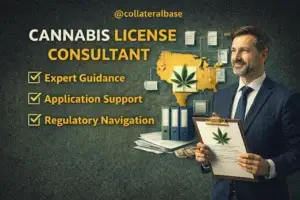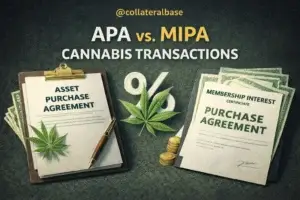https://youtu.be/1EXFrSeV7lc
Illinois Cannabis Zoning Laws depend greatly on the local governments that are placing “reasonable” restrictions on their community’s cannabis businesses that may operated in their jurisdictional limits. Many communities require a “special use permit” for having cannabis business operations. Then, there are certain set-backs to that limit the distance a cannabis company may be from certain sensitive businesses or schools, churches, and other things in the city that they want to keep the cannabis business away from by using their zoning authority. Here’s a lot more on the Illinois Cannabis Zoning Laws.
At the beginning of this year, Illinois’ cannabis legalization bill, formally known as the “Cannabis Regulation and Tax Act” (the “Cannabis Act”), went into effect. The Cannabis Act creates a comprehensive licensure scheme for the cannabis industry, and allows for adult, recreational use of cannabis. Governor Pritzker kicked off the Cannabis Act by pardoning over 11,000 people convicted of marijuana crimes.
Still, plenty of local communities are approaching legalization with much more caution, and sometimes fear. Lake County, the third-most populous county after Cook and DuPage, intends to impose a one-year moratorium on cannabis in the unincorporated parts of the County. In a lengthy Report of the Recreational Cannabis Task Force, Lake County freely states that
“local government attorneys have differing interpretations of the Act on whether communities can enact separate licensing requirements. It is essential that every community consult with their own counsel prior to enacting a licensing mechanism.”
- WHAT DOES THE CANNABIS ACT SAY?
The Cannabis Regulation and Tax Act can be found at 410 ILCS 705/1-5 et seq. Certain parts of the Cannabis Act directly and explicitly preempt any state and local government from regulating cannabis. Section 55-90 of the Act reads:
Except as otherwise provided in this Act, the regulation and licensing of the activities described in this Act are exclusive powers and functions of the State. Except as otherwise provided in this Act, a unit of local government, including a home rule unit, may not regulate or license the activities described in this Act. This Section is a denial and limitation of home rule powers and functions under subsection (h) of Section 6 of Article VII of the Illinois Constitution.
That is, local governments are prohibited from regulating in the area of cannabis except when the Cannabis Act specifically allows it.
Illinois Cannabis Zoning Restrictions on Municipalities
Note the reference to “home rule powers and functions” in the Illinois Constitution. Article VII, Section 6 of the Illinois Constitution sets forth the definition and rules governing home rule units. Basically, any County which elects a chief executive officer, or any municipality with over 25,000 people constitutes a “home rule” unit. Home rule units are given a great degree of authority to govern their internal affairs. If you’re reading this in Chicago or in the Chicago suburbs, you probably live in a home rule county and probably a home rule city or village as well. And as sub-section (m) of this part of the Illinois Constitution provides, “[p]owers and functions of home rule units shall be construed liberally.”
Conversely, Article VII, Section 7 of the Illinois Constitution covers non-home rule units of government. These units are essentially limited to a few fiscal powers in the Constitution, and then anything else granted to them by other laws. See, e.g., Hawthorne v. Village of Olympia Fields, 790 N.E.2d 832 (Ill. 2003) (striking down a zoning ordinance that had the effect of prohibiting an otherwise lawful home daycare center) If you are reading this from a rural, agricultural community, there is a good chance you live in a non-home rule municipality.
So what is the status of zoning restrictions and moratoriums, like those out of Lake County? Section 55-25 discusses local ordinances. While Section 55-25 allows local governments to enact restrictions on the time, place, and manner of legal cannabis, they may not use zoning ordinances as a cover to effectively ban cannabis. Specifically, subsection (1) provides:
A unit of local government, including a home rule unit or any non-home rule county within the unincorporated territory of the county, may enact reasonable zoning ordinances or resolutions, not in conflict with this Act or rules adopted pursuant to this Act, regulating cannabis business establishments. No unit of local government, including a home rule unit or any non-home rule county within the unincorporated territory of the county, may prohibit home cultivation or unreasonably prohibit use of cannabis authorized by this Act.
Local governments like Lake County may be limiting cannabis under the guise of protecting the “health, safety, and welfare” of the community, or some similar phrase. Such justifications should be treated with skepticism, no matter what the issue is. But with respect to bans like Lake County’s, it’s difficult to see how they could possibly be within the bounds of the Cannabis Act.
Illinois Cities May “Reasonably” Restrict Cannabis Businesses with Zoning.
Section 55-25 limits zoning ordinances to those which don’t “unreasonably” prohibit legal uses of cannabis, and there’s nothing more unreasonable than a blanket prohibition or moratorium. For rural, non-home rule municipalities, they might totally lack the authority to enact such zoning ordinances with or without the authority granted by the Cannabis Act. See Hawthorne, supra. Municipalities that get in the way of the overwhelming public support and public demand for legal cannabis are putting themselves at a huge risk for litigation that they stand a strong chance of losing. In Lake County alone, there are roughly 700,000 residents (including your humble author), and many of them won’t be happy when they find out that the County Board is curbing their hard-won rights under the Cannabis Act.
Key Takeaways of Cannabis Zoning in Illinois
- Illinois Zoning Changes Depending on What City Are Located
- To find your cities zoning ordinance, Google: “(Your City) Cannabis Ordinance”
- Illinois Cannabis Laws allow ‘reasonable’ zoning restrictions
- Cities in Illinois cannot ban cannabis or home grow for medical cannabis patients.
How To Get Help With Your Cannabis Zoning Issues
Feel free to call our firm with all your real estate questions regarding cannabis zoning, there are many levels of interactions with local governments and we are experienced with assisting business clients in their real estate matters, whether related to cannabis, or not.





